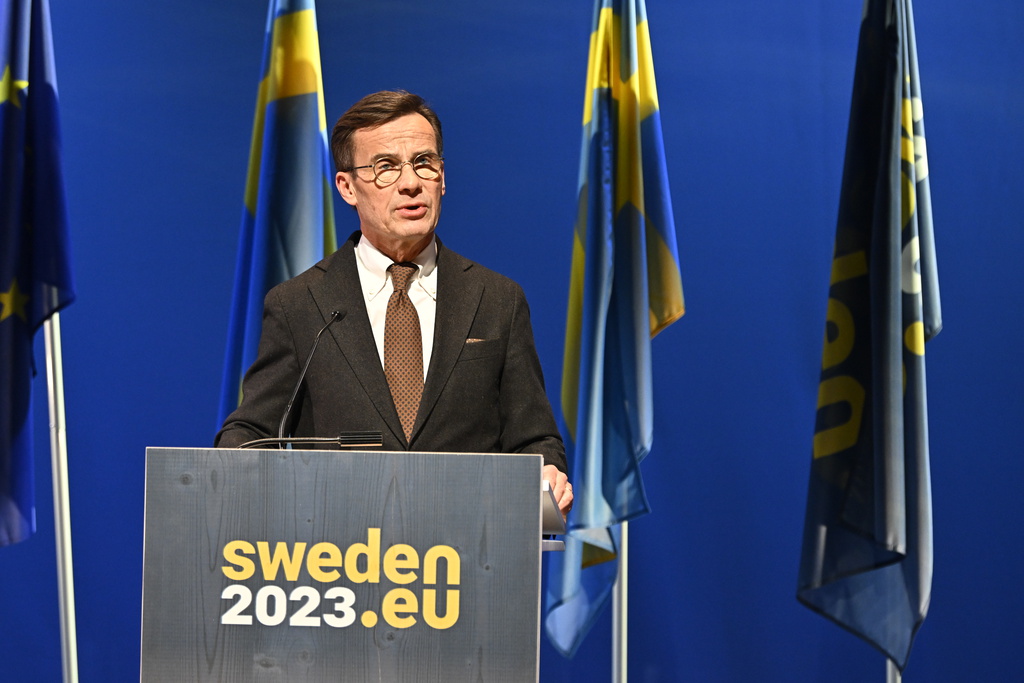Facts: Presidency of the European Union
The main task of the country holding the EU Presidency is to lead meetings of the Council of Ministers and ongoing negotiations with the EU Parliament and the EU Commission. However, all regular summits are held in Brussels under the leadership of the Council’s permanent president, former Belgian Prime Minister Charles Michel.
The presidency rotates among all member states for six months at a time. This is what the list will look like in the next few years:
2023: Sweden (spring), Spain (autumn)
2024: Belgium (spring), Hungary (autumn)
2025: Poland (spring), Denmark (autumn)
Sweden previously held the presidency in the spring of 2001 and the fall of 2009. The next one will not take place until 2036 at the earliest.
Under a certain amount of pressure, Sweden took over the EU presidency last winter. The predecessor, the Czech Republic, was praised for its approach to the task – surely the experienced Swedes would at least also succeed?
The main task is not impressive: to advance legislative work and move it into negotiations. Just like a football referee, a job well done can be a job that goes unnoticed.
In this sense, Sweden has provided, believes Göran von Sydow, director of the Swedish Institute for European Political Studies (Sieps).
– They did what was in the pipeline and moved the common agenda forward in a way about which there is no reason to have critical thoughts, he says.
Elisabeth Kuiper of Brussels-based EPC agrees.
They conducted the mediation task in a neutral manner.
higher rate
Ulf Kristersson’s government, which had only been in power for a few months when the presidency began in January, leaned heavily towards Swedish officials in Brussels.
“They were, of course, professionals because they’ve been involved before,” notes Elisabeth Kuiper.
One progress is the Asylum and Migration Agreement concluded the other week, after long-standing hurdles. EU Home Affairs Commissioner Ylva Johansson has pursued the issue for several years, and Swedish Migration Minister Maria Malmer Steinergaard (M) has served as chair of the meetings during the presidency.
– It’s a difficult and complex issue. And they’ve been able to push it forward at a slightly higher rate than many expected, says Goran von Sydow.
Elisabeth Kuiper said the new government’s restrictive immigration policy, the EU’s role and the SD’s critical migration as a supporting party had caused some in Brussels to doubt whether the country holding the presidency would play an active role in the matter.
– But in the end, the responsible Swedish minister seemed to stick to the agreement.
Sweden reassessed?
Another convention that has been making headlines recently is the Nature’s Restoration Convention. This includes, among other things, restoring meadows and wetlands. The Swedish negotiators received praise for their ability to muster a sufficient majority behind a compromise relatively quickly.
However, Sweden says no.
The government at home does not like the proposal to have consequences for Swedish agriculture and forestry.
Goran von Sydow says: “It is remarkable that you, as the country holding the presidency, are indicating that you will vote ‘no’ on a compromise proposal that you yourself put forward.
Sweden has had a high standing when it comes to environmental and climate action. So there may be astonishment raised and perhaps also a little reassessment of Sweden in this area.
low profile
One of the personal issues of the Swedish presidency has been to promote long-term competitiveness within the European Union. Goran von Sydow and Elisabeth Kuiper believe that the new strategy presented by the Commission in the region in March can be seen as a success for Sweden.
Otherwise, the overall picture is that Sweden has kept a low profile as president – both on the continent and at home. They, like some countries, are not invested in cultural events in Brussels. And when EU ministers met in Sweden, they didn’t have to travel to Stockholm – the meetings took place in an exhibition hall in Arlanda.
Then there were these talented Czechs. Elisabeth Kuiper believes that, in contrast to their committed style as chairman, Sweden ends up in Lee.
“The Swedish presidency did not stand out,” she sums up.

“Unapologetic writer. Bacon enthusiast. Introvert. Evil troublemaker. Friend of animals everywhere.”









More Stories
More than 100 Republicans rule: Trump is unfit | World
Summer in P1 with Margrethe Vestager
Huge asteroid approaching Earth | World